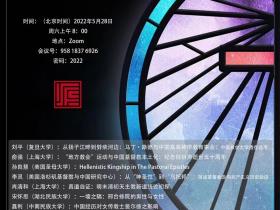News report for Seminar on Search of Martin Luther, the Missing Man in the History of Intellectuals", held by the Sino-European Center at Shanghai University
On December 16, 2020, the Department of History of Shanghai University successfully held the online conference "In Search of Martin Luther, the Missing Man in the History of Intellectuals", which was co-organized by the Sino-Europe Center at Shanghai University, the School of Philosophy at Fudan University, and the Center for Studies of Jingjiao at Tsinghua University. More than thirty scholars from Tsinghua University, Peking University, Renmin University of China, Chinese Academy of Social Sciences, Fudan University, Zhejiang University, Nankai University, Wuhan University, Sichuan University, etc. were invited to speak online and discuss together. In addition, a number of scholars, including Professor Zhuo Xinping from the Chinese Academy of Social Sciences and Professor Yang Huilin from Renmin University of China, provided written contributions to the conference.
The conference was held at 9:00 am on time. The opening ceremony was presided over by Professor Paulos Huang, Director of the Sino-European Center at Shanghai University and a Chinese scholar from Finland. In total, more than 350 scholars and participants attended the conference. In addition to the participation of the academic session, journalists from Paper News and China Nation News also attended the conference.
At the conference, representative scholars from Chinese academia discussed the themes of Luther's holistic value, historical and sociological value, philosophical and historical value of philosophical, intellectual and cultural value, and Luther as the initiator of modernity.
The conference had five sessions. The first session was on the holistic value of Luther, chaired by Prof. Guo Changgang, Director of the Institute of History, Shanghai Academy of Social Sciences, with Prof. Paulos Huang, Prof. Zhuo Xinping, Prof. Huang Yusheng, Prof. Zhao Lin, Prof. You Xilin, and Prof. Yuan Zhaohui presenting.
The second session, on the historiographical and sociological value of Luther, was chaired by Prof. Xiao Qinghe, Director of the Center for the Study of Religion and Chinese Society, Shanghai University, and was addressed by Prof. Sun Lixin, Prof. Yu Tao, Prof. Luo Henglin, Prof. Qian Jinfei, Prof. Wang Yaping, and Prof. Lin Chunjie.
The third session, on the value of Luther's philosophical thought and history, was moderated by Associate Professor Liu Zhaojing of the China-Europe Center at Shanghai University, and featured presentations by Professors Jiang Yi, Qu Xutong, Zhang Shiying, Xu Fenglin, and Sun Shuai.
The fourth session, on the theme of Luther's philosophical and cultural values, was moderated by Prof. Liu Yi of the China-Europe Center at Shanghai University, and was addressed by Prof. Li Qiuling, Prof. Xie Wenyu, Prof. Tian Haihua, Prof. Liu Ping, and Prof. Zhang Lu.
The fifth session was chaired by Dr. Wang Hao of the China-Europe Center at Shanghai University, and featured presentations by Professors Sun Xiangchen, Zhai Zhihong, Zeng Shaokai, Zhu Donghua, and Liu Qingping.
The closing ceremony of the conference was chaired by Prof. Zhang Yong'an, Dean of the College of Liberal Arts at Shanghai University, who made a concluding speech and gave a full affirmation of the expected results achieved by this conference.
Although the conference was held online, the enthusiasm of scholars for the discussion of the issue was still felt. The brilliant speeches of some scholars got the attention of online media. The Social Science Journal of Shanghai Academy of Social Sciences published some of the speeches of the conference in its online version on December 15, 2020, such as "The Need for Translation and Publication of Martin Luther's Works" by Professor Zhuo Xinping, a member of the Standing Committee of the National People's Congress, a member of the Chinese Academy of Social Sciences, and former president of the Chinese Religious Society, and "Re-reading 'Justice' and 'Legitimacy', 'Righteousness' and 'Self-Righteousness' from Martin Luther". by Professor Yang Huilin, former vice president of Renmin University of China.
Professor Paulos Huang, Director of the Sino-European Center at Shanghai University and a Finnish-Chinese scholar, gave a speech at the workshop, "Translation and Research for the 'Search of Martin Luther, the Missing Man in the History of Intellectual'", which was published in the online version of the Paper News on December 17, 2020 under the title "Rediscovering Martin Luther - Translation and Research for the Search of a 'Missing Man'".
This in-depth and fruitful discussion will help to further arouse the attention of the Chinese academic community to Luther and to fully understand his position, value and significance in the social, political and overall intellectual history. Luther's Reformation is of extraordinary significance for the transformation of the world and the development of Chinese society today, and we have been able to capture from his writings and thoughts the sparks of his originality and wisdom, and to ponder the cognitive enlightenment that the Reformation can provide for our development today. Our in-depth study of Luther is not only a review of history, but also a sober examination and understanding of the present, with the aim of building a more mature and better future for humanity.
After the meeting, Dean Zhang Yong'an took a group photo with Prof. Paulos Huang, Prof. Yu Tao from the School of Philosophy of Nankai University, Dr. Wang Hao and some conference organizers in Room 306 of the Faculty of Arts of Shanghai University.
Highlights of the speeches of experts
Prof. You Xilin: It cannot be said in general that Luther is the missing person in the intellectual history. Luther's Religious Reformation has always enjoyed a prominent place in the study of social and intellectual history beyond Christianity, and some history books even refer to 1517 as the beginning of the spiritual event of modernity. This is a profound judgment. Of course, Luther's writings are theological, and why did the debates within theology cause the great historical changes in society? This requires not only the collection and generalization of historical facts from its field of effect in the social sciences, but also a transformative interpretation of the humanistic meaning of theology by the humanities, especially philosophy. The field between social history and the philosophical concept of theology is precisely the history of ideas. The history of ideas connects abstract theosophy with empirical social history, and its special function is to reveal in both directions: both the socio-historical background or origin of the spiritual ideas of theosophy and the socially influential function of the spiritual ideas of theosophy. Therefore, the study of Luther's intellectual history should be the focus of modern research on Luther. Some connections are obvious, such as the separation of church administration from individual faith in Luther's theology and the simultaneous promotion of the practice of separation of church and state, which essentially prefigures the separation of church and state in modern society, and the obvious structural correspondence between the two, which together with the construction of national texts promoted by the translation of the Bible are the foundational prerequisites of the modern nation-state.
Prof. Yuan Zhaohui: The importance of Martin Luther is self-evident, whether as an individual, as a coordinate of intellectual history or across the Renaissance, the Reformation, the Enlightenment and even the entire contemporary society, in a word, he is like a pivot across the important nodes of Western civilization. In this sense, the "Search for the Missing Martin Luther in the History of Ideas" is timely, but it also reflects the embarrassment and inadequacy of the Chinese academic community, or it is a lesson we should seriously remedy. "After all, what kind of attitude, what kind of way, and what kind of direction we take will determine what we get, what we lose, what we have, and what we regret.
Prof. Yu Tao: There have been numerous studies on the life and social welfare policies in the Nordic welfare states, but there is a lack of studies on the relationship between religion and society in the Nordic welfare states due to various constraints. In fact, Lutheran Christianity, as the state religion, has played a great supporting role in the implementation of the Nordic welfare state policies, and has a significant role in the study of Nordic welfare policies, which should be given sufficient attention.
Prof. Liu Qingping: The "history of ideas" here refers to the top-level history of ideas composed of thinkers who, through their original ideas, have had a lasting impact on people and even changed the course of history. Martin Luther is certainly a thinker on this level, because his concept of "justification by faith", which he expounded from a unique perspective, not only opened up the Protestant tradition at that time and contributed to the historical transformation from the Middle Ages to the modern era, but also continues to transcend the boundaries and academic circles of Europe and America even today, profoundly changing the life trajectory of many people. It has profoundly changed the course of many lives. Of course, "justification by faith" was not Luther's invention. But in expounding this central idea, which dates back to the Old Testament book of Genesis, his radical critique of the Catholic claim of justification by works gives it some original depth while continuing the original paradox of the idea.
Prof. Xu Fenglin: In 1977, at a theological dialogue between the Finnish Lutheran Church and the Russian Orthodox Church in Kiev, the Finnish theologian Mendomar gave a presentation entitled "Salvation as Justification and as Deification", in which he argued the similarity between Luther's idea that "Christ is in faith itself" and the Orthodox idea of theosis. Mendomar later expanded this thesis into a book, entitled Christ in Faith. From that time on, Mendomar and his students did a great deal of work on Lutheran studies, which led to the formation of the "Finnish school" of Lutheran studies. The purpose of this presentation is not to sort out and explain how Mendomar discusses the similarities between Luther's thought and Orthodox thought, but rather to present some views on the similarities and differences between Luther and Orthodoxy, based on Mendomar's thesis and the views of modern Orthodox theologians.
Prof. Li Qiuzhong: If Otto the Great in the 10th century A.D. represents the rise of the German national spirit, Martin Luther in the 16th century A.D. represents the rise of the German religious spirit, and Kant in the 18th century represents the rise of the German philosophical spirit. Although Lutheranism, as a result of Luther's Reformation, was the state religion of Kant's Prussian kingdom, Kant never mentioned the name of his predecessor in all his writings and letters, nor did he even never mention Lutheranism. However, Kant, who after all came from a Lutheran pietistic family and was sent to study at the Friedrich public school organized by pietism from his childhood, could not have been unfamiliar with Lutheran doctrine, so much so that it was clearly an important object of reflection for him in his later years when he was writing his religious works.
Prof. Feng Zilian: What is the Finnish School? Compared to Martin Luther, the missing man in the history of thought, I believe most Chinese readers will be more unfamiliar with the Finnish school. Indeed, I had the same feeling when I first came across Mendomar's writing, for example, he especially emphasized that "Christ is in faith itself" and that "faith is the creator of divinity", as if man has a part of divinity through faith itself. This is very different from our traditional understanding of justification by faith, that is, that man is only declared righteous, that his sins are forgiven but that his nature is not changed. However, if we can understand the context in which the Finnish school arose, we may be able to have a deeper understanding of this change, that is, the new interpretation of Martin Luther by the Finnish school. In fact, since Finland has historically been part of Sweden and King Gustav I of Sweden carried out the Reformation in order to strengthen centralization, Protestantism and Lutheranism have always been a strong religious tradition in Finland.
Prof. Yang Huilin: It is probably in this sense that Paul Tillich's comment on "religious painting" is the same as Martin Luther's comment on "burning incense, singing, ringing bells" and the "good works" of "kneeling in church all day": "Religious content itself does not produce religious painting. The "good work" of "kneeling all day in church": "Religious content does not in itself produce religious paintings, but many of the paintings you find in church magazines, in the Sunday tabloids of churches, or in the meeting rooms of churches and in the prayer rooms of pastors All have this type of character. In this sense, they lead to the danger of blasphemy. Everyone who understands the contemporary situation must oppose them.






评论